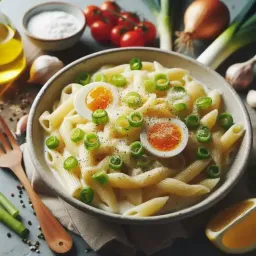Freezing Eggs 101: Everything You Need to Know
When it comes to managing surplus eggs, freezing can be a game-changer. Not only does it extend the shelf life of your eggs, but it also offers convenience and flexibility in the kitchen. Let's delve into why freezing eggs is a smart choice and how it can revolutionize your meal prep.
Unlocking the Benefits of Freezing Eggs
Preserving Freshness: Freezing eggs allows you to capture their freshness at peak quality. By sealing in nutrients and flavors, you can enjoy farm-fresh eggs even months down the line.
Convenience: With frozen eggs on hand, you have a versatile ingredient ready for various recipes. Whether you're whipping up a batch of fluffy pancakes or baking a decadent cake, frozen eggs offer unmatched convenience.

Economic Savings: By freezing eggs, you can prevent wastage and make the most of your resources. Instead of letting surplus eggs go to waste, freezing enables you to preserve them for future use, saving you money in the long run.
Challenges of Egg Preservation
Storage Constraints: One challenge of egg preservation is finding adequate storage space. Freezing requires sufficient freezer capacity, which may be limited in some households.
TIP: Always read through the entire recipe before starting to ensure you have all the necessary ingredients and tools.
Texture Alterations: While freezing preserves the nutritional value of eggs, it can slightly alter their texture. Understanding these changes and how to mitigate them is crucial for optimal results.
Thawing Considerations: Properly thawing frozen eggs is essential to maintain their integrity. Incorrect thawing methods can result in texture degradation and potential food safety risks.
The Versatility of Frozen Eggs
Baking: Frozen eggs are excellent for baking purposes, serving as a reliable substitute for fresh eggs in cakes, cookies, and other baked goods. Their binding properties help create moist and tender baked treats.
Cooking: From omelets to quiches, frozen eggs can elevate your savory dishes with minimal effort. Simply thaw and incorporate them into your favorite recipes for a quick and satisfying meal.
Meal Prep: Whether you're meal prepping for the week or stocking your freezer for busy days, frozen eggs offer unmatched versatility. Pre-scrambled eggs or portioned egg whites make meal preparation a breeze.
In essence, understanding the benefits and challenges of freezing eggs empowers you to make informed decisions about preserving this kitchen staple. With proper techniques and a dash of creativity, frozen eggs can revolutionize your culinary repertoire.
Our in-depth coverage on Delve into handling farm fresh eggs provides a wealth of information and insights. Be sure to check it out for a comprehensive understanding of the topic.
Raw vs. Cooked: Which Eggs Freeze Better?
When it comes to freezing eggs, the debate between raw and cooked eggs often arises. Each method has its pros and cons, and understanding them can help you determine the best approach for your needs.
Pros and Cons of Freezing Raw Eggs
- Convenience: Freezing raw eggs in their shell is straightforward and requires minimal preparation. Simply crack the eggs into a container or ice cube tray, freeze until solid, and transfer to a freezer bag for long-term storage.
- Texture Concerns: One downside of freezing raw eggs is the potential for texture changes upon thawing. Raw egg whites may become slightly rubbery, while egg yolks can thicken and develop a gel-like consistency.
- Versatility: Despite texture alterations, frozen raw eggs are still suitable for use in various recipes, particularly those that involve baking or cooking. However, they may not be ideal for dishes that rely on the texture of fresh eggs, such as sunny-side-up eggs or poached eggs.
Considerations for Freezing Cooked Eggs
- Texture Preservation: Cooking eggs before freezing can help maintain their texture and prevent undesirable changes upon thawing. Scrambled eggs, omelets, and quiches are popular options for freezing, as they retain their moisture and tenderness well.
- Flavor Enhancement: Cooking eggs before freezing allows you to incorporate additional ingredients and seasonings, enhancing their flavor profile. From herbs and spices to cheese and vegetables, the possibilities for customized egg dishes are endless.
- Storage Considerations: Cooked eggs should be fully cooled before freezing to prevent condensation and freezer burn. Once cooled, portion the eggs into individual servings or larger batches based on your preferences and intended usage.
Ultimately, whether you choose to freeze raw or cooked eggs depends on your culinary preferences and intended applications. Experimenting with both methods can help you discover the best approach for maximizing the versatility and convenience of frozen eggs.
Mastering the Art of Freezing Eggs
Now that you understand the benefits and considerations of freezing eggs, it's time to master the art of egg preservation. With the right supplies and techniques, you can ensure successful freezing and enjoy the convenience of having eggs readily available whenever you need them.
Essential Supplies for Successful Freezing
- Storage Containers: Choose freezer-safe containers or bags that are specifically designed for long-term storage. Opt for containers with tight-fitting lids to prevent freezer burn and maintain freshness.
- Egg Separator: If you prefer to freeze egg whites and yolks separately, invest in an egg separator to facilitate the process. This tool allows you to divide eggs with precision, ensuring optimal results in your recipes.
- Labeling Materials: Properly label your frozen eggs with the date of freezing to track their freshness. Use waterproof markers or adhesive labels that adhere well to freezer containers, minimizing the risk of smudging or fading over time.
Step-by-Step Guide to Freezing Eggs
Follow these simple steps to freeze eggs effectively:
- Crack and Separate: Crack the eggs into a clean bowl, taking care to remove any shell fragments. If desired, separate the yolks from the whites using an egg separator.
- Portion and Package: Pour the eggs into freezer-safe containers or ice cube trays, depending on your preferences. For whole eggs, consider using silicone molds or muffin tins to create individual portions.
- Seal and Store: Seal the containers tightly to prevent air exposure and freezer burn. Label each container with the date of freezing and any additional notes, such as the number of eggs or their intended use.
Tips for Properly Thawing Frozen Eggs
Thawing frozen eggs requires careful planning to ensure safe and efficient usage:
- Refrigerator Thawing: For the best results, transfer the frozen eggs to the refrigerator and allow them to thaw slowly overnight. This gradual thawing process helps maintain the integrity of the eggs and minimizes the risk of bacterial growth.
- Cold Water Bath: If you're short on time, you can thaw frozen eggs more quickly by placing them in a sealed bag or container and submerging them in cold water. Change the water every 30 minutes to ensure consistent thawing.
- Avoid Microwaving: While tempting, microwaving frozen eggs can result in uneven heating and potential food safety risks. It's best to avoid this method and opt for gentle thawing techniques instead.
By following these guidelines and tips, you can become proficient in the art of freezing eggs and unlock a world of culinary possibilities. Whether you're baking, cooking, or meal prepping, frozen eggs are sure to become a valuable addition to your kitchen arsenal.
Putting Frozen Eggs to Use: Delicious Recipes Await
Now that you've mastered the art of freezing eggs and have a stash of frozen eggs ready to use, it's time to explore the culinary possibilities that await. From breakfast classics to savory dinners and decadent desserts, frozen eggs can elevate your cooking to new heights.
Exploring Recipe Options for Frozen Eggs
Here are some delicious recipes that you can try using your frozen eggs:
- Quiche: Whip up a flavorful quiche using frozen eggs, cheese, vegetables, and your favorite seasonings. Whether you prefer a classic quiche Lorraine or a veggie-packed variation, frozen eggs provide a convenient base for this versatile dish.
- Baked Goods: Use frozen eggs to create an array of baked goods, including cakes, cookies, muffins, and bread. Frozen eggs blend seamlessly into batters and doughs, contributing moisture and structure to your favorite treats.
- Frittata: Whip up a quick and satisfying frittata using frozen eggs and an assortment of ingredients from your pantry and refrigerator. From leftover veggies and meats to cheese and herbs, frittatas are endlessly customizable and perfect for any meal of the day.
- Breakfast Burritos: Prepare hearty breakfast burritos using frozen eggs, cooked sausage or bacon, cheese, and salsa. Roll up the filling in flour tortillas and freeze individually for a convenient grab-and-go breakfast option.
Alternative Egg Preservation Methods
In addition to freezing, there are several alternative methods for preserving eggs:
- Water-Glassing: Water-glassing, or preserving eggs in a solution of water glass (sodium silicate), is a traditional method that can keep eggs fresh for several months. This technique involves coating the eggs in a protective layer that seals out air and bacteria.
- Pickling: Pickling eggs in a vinegar-based brine is another popular preservation method that adds tangy flavor to the eggs. Pickled eggs can be enjoyed as a snack or served alongside salads and sandwiches.
- Dehydrating: Dehydrating eggs involves removing the moisture from the eggs to create a shelf-stable powder. Dehydrated eggs can be rehydrated with water and used in recipes that call for eggs, such as pancakes and custards.
Conclusion and Next Steps
By exploring the diverse range of recipes and preservation methods available, you can make the most of your frozen eggs and enjoy delicious meals year-round. Whether you're baking a batch of cookies, whipping up a hearty breakfast, or experimenting with pickling, frozen eggs offer endless culinary possibilities. Get creative in the kitchen and let your imagination soar!

 Emma
Emma

